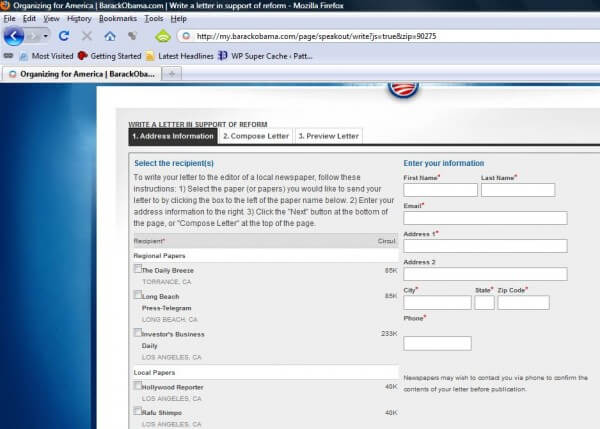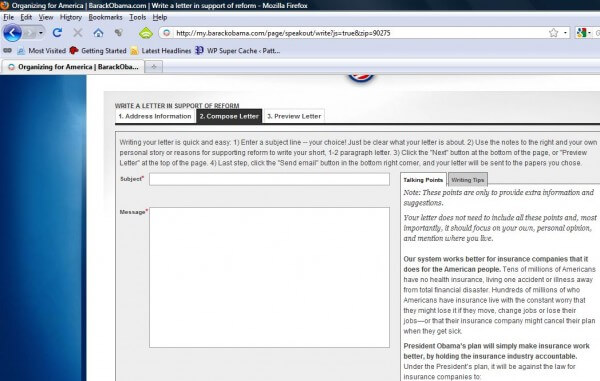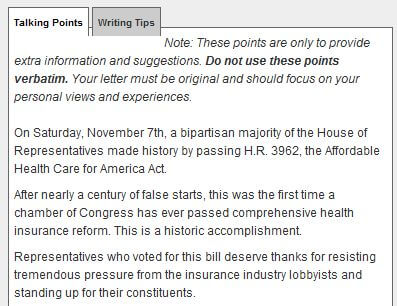One of the principal functions of political blogs is to keep Big Media in check. If you are concerned by the discovery this past weekend of a spate of pro-Obama Astroturfing, it’s because you agree that political persuasion should not be accomplished through misleading tactics. To the extent that Big Media is enabling such tactics, through sloth or purpose, we must hold them accountable.
Towards that end, I am pleased to see that at least two editors address the Astroturfing issue head-on. One published the infamous Ellie Light letter; the other published Astroturf originating from the web site of the Democrat party.
First, courtesy of SarahW on Twitter, we have the editor of Ohio’s Chillicothe Gazette.
Interestingly, he appears to understand the significance of the issue, and has implemented procedures to prevent Astroturfing. But they didn’t work, because of the dishonesty of “Light”:
By now, much is being made of the letter-writing campaign of “Ellie Light”, who apparently had her letter defending President Obama published in the Jan. 17 Gazette and — both before and after — a lot of newspapers and with different local addresses.
I’ve written several times on Astroturfing — a way of sending form political letters to multiple news outlets with a few key strokes — and authored a column on Jan. 17 on how the Gazette was bolstering Opinion page procedures to make sure the opinions submitted were true and accurate.
Yes, the irony of having a letter to the editor situation blow up in your face just days after saying the newspaper is following new procedures isn’t lost on me. It’s embarrassing and regrettable.
But if we hadn’t followed those procedures, I’d feel a lot worse.
In this case we did follow them and were lied to about the local nature of the opinion and the address used. In short, we were duped.
Just how he was duped is fascinating, and I think deals a blow to the idea that Light is an unsophisticated grandma:
We received Light’s letter via e-mail (sent from a Yahoo! address) on Jan. 6. The letter did not appear to have the telltale signs of Astroturf (framed a specific way, key phrases, etc.). One thing the original letter did not contain, however, was a street address or a phone number, which is required for our verification purposes.
So, on Jan. 7, we wrote her a reply e-mail and asked her to provide both. She provided a street address on Cherokee Road in Chillicothe and a phone number and verified both her opinion and her street as local.
Interesting. I still have my doubts about whether Ellie Light is a single person, as opposed to some employee of an Axelrod-affiliated P.R. firm. If she is, however, she somehow was able to prove an apparently genuine local Ohio address, and a phone number (whether that was local, the editor does not say). That’s quick thinking for someone who has an IP address tracing back to Huntington Beach. (If indeed that Ellie Light is not a P.R.-generated lightning rod designed to absorb attention from the larger concern of who might be behind her effort.)
I think the editor might want to follow up on the address to see if it is indeed genuine — if he truly thinks this is an important issue.
More at the link, which I advise you to read in its entirety.
Second, we can thank Bradley J. Fikes for asking the relevant editor at the North County Times to respond to the fact that his paper printed Astroturf from the Democrat party. The editor sent me the following e-mail, which has been reprinted at the paper’s site:
Patterico:
The North County Times may be unique in its treatment of letters to the editor. We publish all letters that we receive that are from someone within our circulation area or concern a topic of local interest (limiting writers to once every other week). We don’t pick and choose letters for “worthiness” or “political balance,” but run them on, roughly, a FIFO [first in first out] basis. When volume picks up we add additional letters space to the section (we have run as many as five pages of letters during the peak of a hot election).
So, publishing a letter that contains language duplicated elsewhere isn’t surprising.
On a number of occasions, we have been hit with letter writing campaigns by organizations who suggest “talking points” to their members. For instance, a few years ago during one of Bush’s state of the union speeches I was hit with dozens of letters from people with local addresses beating on the president’s remarks with nearly identical wording —- and this was 20 minutes before Bush had finished his remarks. I emailed several of the writers back to ask if this was part of a MoveOn.org letter campaign. Several people wrote back to affirm it as so.
Our normal procedure with a letter is to call the writer to confirm the authorship (an admittedly loose verification system, but that is one price of publishing more than 6,000 letters a year). If we catch some one plagiarizing, we will ban or warn and ban on a reoccurrence (adopting suggested language doesn’t strike me as plagiarism even if it is lazy). If we find a copy and paste campaign, we typically will run one or two as examples and discard the rest. We also don’t knowingly allow false signatures on letters.
When facts are obviously in error, we will edit it, try to get the letter writer to straighten it out, or reject the letter if it is unsalvageable.
Regarding organized letter writing campaigns, however, I’m not particularly alarmed by them. People from all across the political spectrum adopt other people’s language and use it for various purposes including debating with their friends and neighbors. Nothing new there. It’s just easier to mount letter campaigns with the internet —- doesn’t cost you postage.
Since you have raised the question about this particular letter, I have left a voice mail and sent an email query to its author. She appears to be a local citizen (there are several internet traces of her presence locally). I’ll let you know how it comes out.
Best,
Kent Davy
I appreciate the e-mail, but I think this attitude misunderstands the need for disclosure. As I explained in an earlier post, when people repeat talking points fed to them by a large organization, and pass them off as their own, readers may well be misled:
While the participants were undoubtedly well-meaning, the effect is simple. A Centralized Body determines a message. Minions repeat it. And readers are tricked into thinking that the message is individualized.
Clearly, the credibility of the letters is undercut once the reader realizes that the letter writer is passing along other people’s thoughts verbatim. It is indeed plagiarism, although authorized, because it is not “quoting” with attribution but rather disguising another’s writing as one’s own. When you realize that you are reading a Central Organization’s thoughts, you realize that the letter writer may have put very little thought into sending the letter. Indeed, the letter writer might not even agree with all of the things he himself “said.”
Granted, it’s “just” a letter to the editor. Maybe it’s nothing to you. But it’s allotted space given to someone to try to persuade. Large political organizations motivate people to do this because it works. And it works with the element of deception.
It’s a small deception, to be sure. Venial, not mortal. But deception nonetheless.
And by deliberately failing to tell readers that the letter is mass-produced, the editor of the North County Times is knowingly aiding and abetting that small deception. I don’t think he should be.
But I do thank the editor for his response.
Finally, I have received all sorts of recent tips and theories as to who “Ellie Light” might be. This may well be useful information, if we learn it — but I urge people not to get too carried away with that question, such that they lose sight of the bigger picture. Which is the need to work to eliminate deception from our political discourse.
Of course that effort will never be entirely successful — just like we’ll never wipe out crime. But that doesn’t mean it’s not worth the effort.
To the extent that revealing Ellie Light’s identity helps that cause, great. Just don’t take your eye off the ball.
UPDATE: The first version of this post erroneously said (in one place) that Bradley’s paper published the Ellie Light letter. This is an error that I thought I had caught before publishing, but Firefox crashed as I was composing the post and apparently the edit didn’t take. Sorry for the confusion.
UPDATE x2: Another newspaper chain apologizes. (See updates.)







